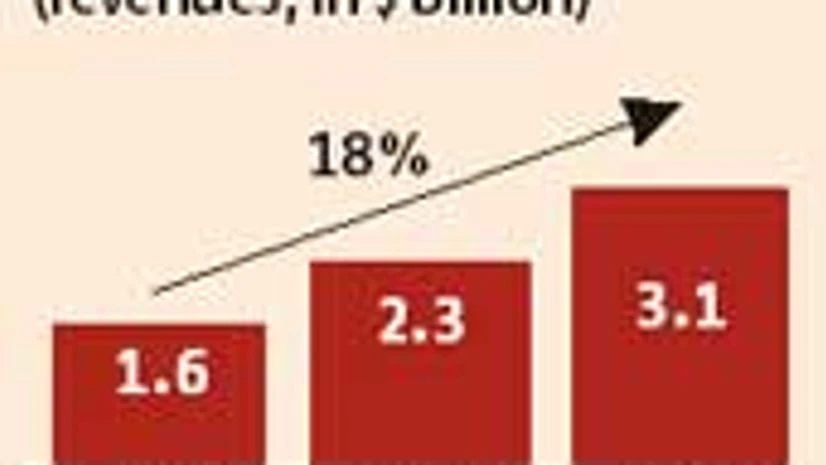This is the dilemma companies face today, as they negotiate the path towards becoming a better oiled machine in an uncertain global economic climate. Genpact, a vanguard of the business process outsourcing (BPO) industry in India, and a competitor to global giants such as Accenture and IBM, sits squarely in the middle of this debate.
A company like Genpact is far bigger than any of the Indian IT service companies such as Infosys or TCS which began to compete for BPO business a few years ago. Its empire is also far-flung and its global delivery centres, now in places like Eastern Europe and Latin America, allow it to service a wider client base unlike many of its IT services brethren. Yet, winning a deal against them is no longer a given for Genpact.
For instance, Accenture, IBM and Genpact together account for 50 per cent of the FAO (finance and accounting outsourcing) market in terms of annual contract value (ACV), according to the Everest Group, a research outfit. In 2011, Accenture, Capgemini and Infosys BPO signed the highest number of new contracts while Accenture, TCS, and IBM accounted for about 50 percent of total contract value signed in the same year, including new contracts, renewals and extensions. "Competition is very, very intense. Genpact today gets a seat at the table but it isn't a foregone conclusion that they will win the deal," says Saurabh Gupta of Everest.
That doesn't mean the company is on the back foot. Its CEO, N V ('Tiger') Tyagarajan, points to the firm's 100 per cent client renewal rate which signifies anything but and Genpact's other division heads refer to the company's 25 per cent growth (once you strip out General Electric's business, approximately a fourth of the firm's revenues but has flat growth.) Analysing an end-to-end process and eking out savings is not an easy job. For instance, in order to analyse how paying for goods within a company can be streamlined ('Source-to-pay' in industry parlance), Genpact breaks it down to some 432 different steps. Every one of these in turn has a best-in-class metric and a worst-in-class one. Finally, the company figures out how to propel a company into the former category.

"You don't need a $100 million technology to get someone to best in class," says Tyagarajan. "We have millions of stories of customers who spend zillions of dollars on tech platforms that have not given them an answer that they wanted and in effect they ended up pouring money down the drain. The technology was actually good, but they didn't fix the process first," he adds. Tyagarajan says that for an IT firm that is trying to make a mark in the BPO world, it simply must understand the complexities of the entire end-to-end process and also forge a deep partnership with the firm that allows it to implement change. According to Tyagarajan, when technology-focused companies approach this world, their customers increasingly say, 'Guys I can't implement this technology unless you fix my process.' "But how do you build that over time, especially when someone like us has already built it for the past 15 years while talking to CFOs, sales heads and other people in order to understand their business at a granular level?" adds Tyagarajan
This imperative is further heightened when you consider the relentless speed at which firms are spreading their tentacles across the world in a quest for new markets. For instance, in the shifting sands of the pharmaceutical industry today, it is common for companies to undertake several hundred acquisitions of various sizes in different countries over a decade. Soon, the company finds that it has become a decentralised entity with non-standard systems of accounting, finance and payroll. Also at stake are varied and complex compliance issues that need to be sorted out. Companies like Genpact bring order to this chaos and are more needed today than at any other time.

Yet, for all of Genpact's success, analysts have basic questions on future client retention. "BPO-only services have a strong value proposition for the first three-five years of an engagement driven by arbitrage and operational efficiencies and effectiveness - and Genpact has been successful in riding this wave," says Saurabh Gupta, of the Everest Group. But once you're done with that phase, a BPO has to come up with a bagful of tricks that can demonstrate to clients that there is still a lot to be gained in employing the firm.
Which is why the firm has aggressively expanded into analytics that complements its process expertise. It has made savvy acquisitions like Headstrong (capital markets) and Jawood (health care) which not only gives it IT expertise in terms of new 'BPO Platforms' but also a large, new roster of clients in the fastest growing segments of the BPO world. And finally, it has begun to cater to the rapidly growing domestic business landscape. "Now most people are looking at India as a source for business and not just as a delivery centre," says Gupta of Everest. This is good news for an industry battered by a weak rupee and an increasing number of customers relocating to other destinations such as the Philippines.

)
